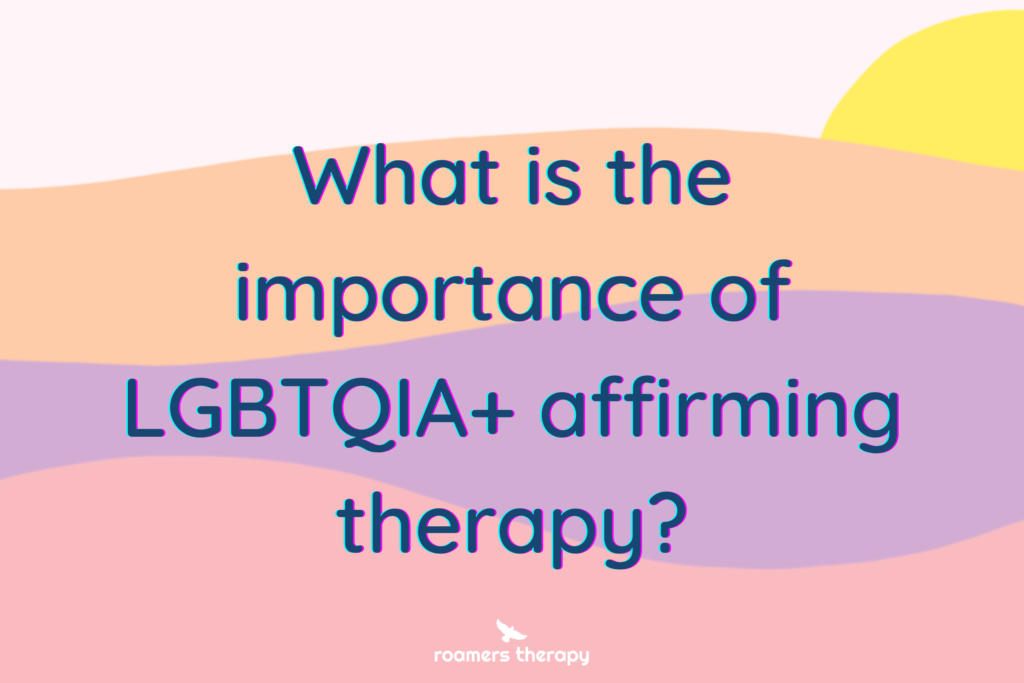What is the importance of LGBTQIA+ affirming therapy?
by Andres Carrion | June 2021
Lesbian, gay, bisexual transgender, queer, intersex, and asexual (LGBTQIA+) affirming therapy is a therapeutic approach that focuses on embracing diverse sexual and gender identities. LGBTQIA+ affirming therapy is much more than being kind and welcoming to clients of diverse identities. It is about validating clients’ experiences and holding space for them to explore the complexities of these social identities. LGBTQIA+ affirming therapy understands that sexual and gender identities are not choices and cannot be pathologized or changed. LGBTQIA+ affirming therapy also works to help clients combat internalized homophobia and transphobia and resolve contradictory or incongruent beliefs clients may have towards themselves.
LGBTQIA+ affirming therapy is important for several reasons. First, LGBTQIA+ people continue to experience disproportionate rates of victimization and violence because of their sexual orientation and/or gender identity. Many LGBTQIA+ individuals do not have a supportive network of people who love and care for them unconditionally. Second, many LGBTQIA+ individuals are not “out” to their health providers (such as doctors and therapists) out of fear that their provider may be dismissive, misunderstanding, invalidating, or disrespectful of their identity. Many people fear that they may receive less than excellent care or may even be turned away because of their identity. Finally, many LGBTQIA+ individuals have distrust in therapy due to the homophobic and transphobic history of the field. For instance, “homosexuality” was in the DSM until DSM III and “gender identity disorder” was in the DSM until the fifth and current edition. Though it can be scary, LGBTQIA+ should feel comfortable and safe to discuss their sexual and/or gender identity with their therapists as well as their concerns with the therapeutic process. The culturally competent and affirmative therapist should be aware of these issues and hold space for their clients to feel safe enough to disclose their identities, discomforts, and fears with their therapist.
LGBTQIA+ affirmative and culturally competent therapy is a right that clients have and a necessity for therapy to be an effective treatment modality. LGBTQIA+ affirmative therapy comes down to safety and whether clients feel safe enough to discuss these topics with their therapists. If you are seeking a LGBTQIA+ affirming therapist, here are some questions you may want to consider asking your new therapist:
- Can you describe your professional orientation to therapy?
- What is your view of LGBTQIA+ people?
- What kind of training or professional experience do you have working with LGBTQIA+ clients?
- What is your approach to working with LGBTQIA+ clients?
- How will you hold space for me and my oppression?
- How do you work with clients who present with similar problems as me?
At Roamers Therapy, our psychotherapists are here to support you through anxiety, depression, trauma and relationship issues, race-ethnicity issues, LGBTQIA+ issues, ADHD, Autism, or any challenges you encounter. Our psychotherapists are trained in Cognitive Behavioral Therapy, Dialectical Behavioral Therapy, Psychodynamic Therapy, Acceptance, and Commitment Therapy, Person-Centered Therapy, and Gottman Therapy.
Whether you’re seeking guidance on a specific issue or need help navigating difficult emotions, we’re ready to assist you every step of the way.
Contact us today to learn more about our services and schedule a session with our mental health professionals to begin your healing journey. To get started with therapy, visit our booking page.
First, decide if you’ll be paying out-of-pocket or using insurance. If you’re a self-pay client, you can book directly through the “Book Now” page or fill out the “Self-Pay/Out-of-network Inquiry Form.” If you’re using insurance, fill out the “Insurance Verification Form” to receive details about your costs and availability. Please let us know your preferred therapist. If your preferred therapist isn’t available, you can join the waitlist by emailing us. Once your appointment is confirmed, you’ll receive intake documents to complete before your first session.
This page is also part of the Roamers Therapy Glossary; a collection of mental-health related definitions that are written by our therapists.
While our offices are currently located at the South Loop neighborhood of Downtown Chicago and Lakeview on Chicago’s North Side, Illinois, we also welcome and serve clients for online therapy from anywhere in Illinois and Washington, D.C. Clients from the Chicagoland area may choose in-office or online therapy and usually commute from surrounding areas such as River North, West Loop, Gold Coast, Old Town, Lincoln Park, Rogers Park, Logan Square, Pilsen, Bridgeport, Little Village, Bronzeville, South Shore, Hyde Park, Back of the Yards, Wicker Park, Bucktown and many more. You can visit our contact page to access detailed information on our office location.

